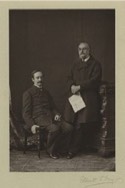Clement-Jones family - Person Sheet
Clement-Jones family - Person Sheet
Birth1823
Death1907
FatherEdward STRACHEY , 10612 (1774-1832)
MotherJuila Woodburn KIRKPATRICK , 10622 (1789-1847)
Spouses
Notes for Sir John STRACHEY GCSI
Sir John Strachey GCSI, CIE (5 June 1823 – 19 December 1907), British Indian civilian, fifth son of Edward Strachey, second son of Sir Henry Strachey, 1st Baronet, was born in London, England. After passing through the East India Company College, Strachey entered the Bengal civil service in 1842, and served in the North-Western Provinces, occupying many important positions. He married Katherine Batten, daughter of Joseph Batten the Principal of the East India Company College, on 9 October 1856,[1] and they had eight children.
In 1861, Lord Canning appointed him president of a commission to investigate the great cholera epidemic of that year. In 1862 he became judicial commissioner in the Central Provinces. In 1864, after the report of the royal commission on the sanitary condition of the army, a permanent sanitary commission was established in India, with Strachey as president. In 1866, he became Chief Commissioner of Oudh, having been chosen by Lord Lawrence to remedy as far as possible the injustice done after the Indian rebellion of 1857 by the confiscation of the rights of tenants and small proprietors of land, maintaining at the same time the privileges of the Talukdars of great landlords. As member of the legislative council he introduced several bills for that purpose, which, with the full approval of the Talukdars, passed into law.
In 1868, he became member of the governor-general's council, and on the assassination of Lord Mayo in 1872 he acted temporarily as viceroy. In 1874 he was appointed lieutenant-governor of the North-Western Provinces. In 1876, by request of Lord Lytton and the secretary of state, he consented to relinquish that office, and returned to the governor-general's council as financial minister, which post he retained until 1880.
During this time, while Lord Lytton was viceroy, important reforms were carried out. The measures for decentralizing financial administration, initiated under Lord Mayo, were practically completed. The salt duties were reduced, and the system under which they were levied was altered, and that opprobrium of the administration, the inland customs line, was abolished. The removal of all import duties, including those on English cotton goods, and the establishment of complete free trade, was declared to be the fixed policy of the government, and this was in great measure carried into effect before 1880, when Strachey left India.
The defective system on which the military accounts were kept occasioned a very erroneous estimate of the cost of the Second Afghan War of 1878-80. For this error Strachey was technically responsible, and it was made the occasion of a violent party attack which resulted in his resignation. The fact that almost the entire cost of the war was paid for out of revenue is a conclusive proof of the state of financial prosperity to which India attained as the result of his administration. From 1885 to 1895 Strachey was a member of the council of the secretary of state for India.
He was joint author with his brother Lt-Gen Sir Richard Strachey of The Finances and Public Works of India (1882), besides writing India (3rd ed., 1903), and Hastings and the Rohilla War (1892). He died in 1907.
In 1861, Lord Canning appointed him president of a commission to investigate the great cholera epidemic of that year. In 1862 he became judicial commissioner in the Central Provinces. In 1864, after the report of the royal commission on the sanitary condition of the army, a permanent sanitary commission was established in India, with Strachey as president. In 1866, he became Chief Commissioner of Oudh, having been chosen by Lord Lawrence to remedy as far as possible the injustice done after the Indian rebellion of 1857 by the confiscation of the rights of tenants and small proprietors of land, maintaining at the same time the privileges of the Talukdars of great landlords. As member of the legislative council he introduced several bills for that purpose, which, with the full approval of the Talukdars, passed into law.
In 1868, he became member of the governor-general's council, and on the assassination of Lord Mayo in 1872 he acted temporarily as viceroy. In 1874 he was appointed lieutenant-governor of the North-Western Provinces. In 1876, by request of Lord Lytton and the secretary of state, he consented to relinquish that office, and returned to the governor-general's council as financial minister, which post he retained until 1880.
During this time, while Lord Lytton was viceroy, important reforms were carried out. The measures for decentralizing financial administration, initiated under Lord Mayo, were practically completed. The salt duties were reduced, and the system under which they were levied was altered, and that opprobrium of the administration, the inland customs line, was abolished. The removal of all import duties, including those on English cotton goods, and the establishment of complete free trade, was declared to be the fixed policy of the government, and this was in great measure carried into effect before 1880, when Strachey left India.
The defective system on which the military accounts were kept occasioned a very erroneous estimate of the cost of the Second Afghan War of 1878-80. For this error Strachey was technically responsible, and it was made the occasion of a violent party attack which resulted in his resignation. The fact that almost the entire cost of the war was paid for out of revenue is a conclusive proof of the state of financial prosperity to which India attained as the result of his administration. From 1885 to 1895 Strachey was a member of the council of the secretary of state for India.
He was joint author with his brother Lt-Gen Sir Richard Strachey of The Finances and Public Works of India (1882), besides writing India (3rd ed., 1903), and Hastings and the Rohilla War (1892). He died in 1907.


